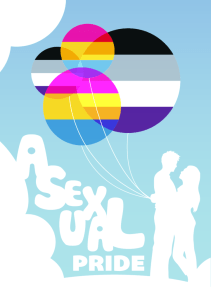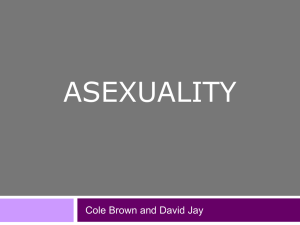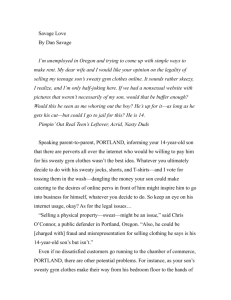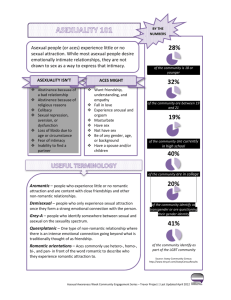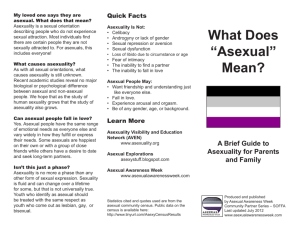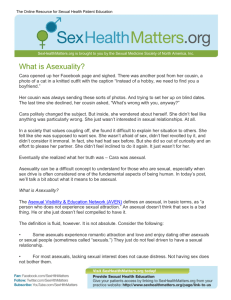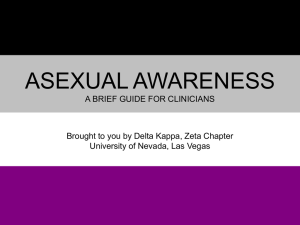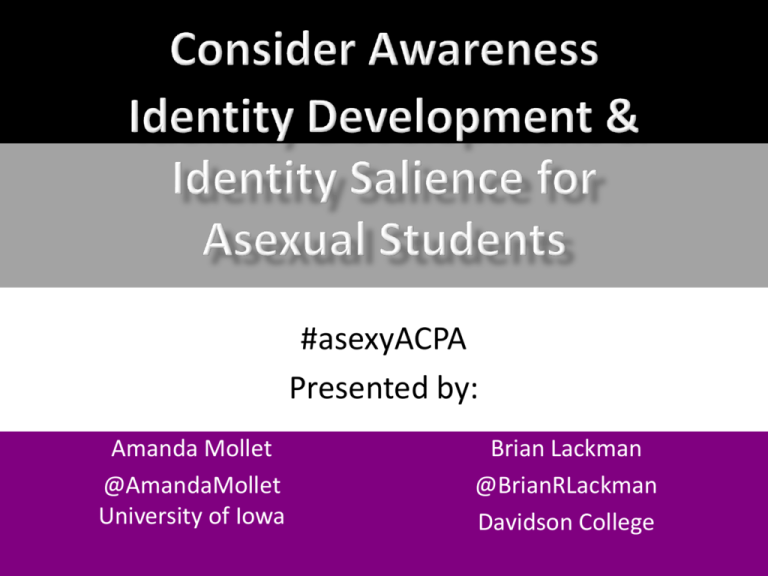
#asexyACPA
Presented by:
Amanda Mollet
@AmandaMollet
University of Iowa
Brian Lackman
@BrianRLackman
Davidson College
Ground Rules
•
•
•
•
•
•
•
•
•
Trigger Warning
Listen actively -- respect others when they are talking.
Be okay with discomfort.
Speak from your own experience instead of generalizing ("I" instead
of "they," "we," and "you").
Participate to the fullest of your ability.
Instead of invalidating somebody else's story with your own spin on
their experience, share your own story and experience.
If you don’t understand something please ask questions.
Be conscious of body language and nonverbal responses.
Take stories with you but not names.
Literature Review
• Kinsey (1948, 1953)
• Post 2000 Research
• Asexuality Visibility Education Network (AVEN)
and online communities
Methods & Sample Overview
•
•
•
•
Exploratory Study
Instrument Design
QUAL + quant
Sampling
Full-Time Students
Two-year College
Age 18-22
Age 23-28
Non-white
Religious
n= 581
85.30%
13.00%
77.90%
18.10%
13.80%
34.60%
Participant Locations
Religion & Asexuality
Previous Studies vs. Our Studies
•Only 34% of our participants identified as being religious/spiritual
“In the Muslim orthodoxy, celibacy is considered unnatural, and people
shouldn't repress sexual desire. So marriage is strongly encouraged. I would
like to get married, but I would like someone who is both Muslim and asexual,
which is a very tiny pool to choose from here in the US.”
“There is a lot of sexual behavior and conversation on campus. I'm always
uncomfortable with people hitting on me, because I don't fully understand
flirting or sexual attraction. Most of the time I'm completely oblivious when
people flirt with me...it just seems like the person is being invasive/acting
strangely. It is only after analyzing the situation later that I can recognize what
was actually going on. I tend to stay away from conversations where people
discuss sex, as I have no experience, so a lot of people are under the
impression that I am either very religious or a prude.”
Asexuality* is a spectrum
SPECTRUM OF ASEXUALITY
Aromantic
Grayromantic
Demisexual
SPECTRUM OF (allo)SEXUALITY
Exclusively
heterosexual
Equally heteroand homosexual
Heteroromantic
Homoromantic
Biromantic
Panromantic
Kinsey (1948, 1953)
Exclusively
homosexual
Understanding Sexual & Romantic
Identity
Participants Self-Identified Definitions
“Being asexual to me means
being able to realize that by
not wanting sex...LIKE never
in my life, I am not broken,
that this is normal and that
there are others who are
like me. It gives me a place
to claim and to allow my
friends and family to
understand why I'm not into
certain things that other
people in their 20's usually
are.”
Participants Self-Identified
Definitions
“It means a priority on emotional intimacy over sexual
intimacy so strongly that I have virtually no sexual intimacy
needs when in an emotionally close relationship. I prefer to
masturbate alone than to have actual sex with partners, even
if in an emotionally-intimate relationship. It does not mean I
have no physical intimacy needs -- I need my hands to be
held, or a hug, at times. It also means loneliness due to lack of
coupling as others do, but also, freedom due to not needing
to operate in relationship the way others do.”
More Than A Label
Why Students Claim Asexuality*
“When I came across people talking about asexuality
online, it was like they had put into words
everything that I had not been able to in my head
because of my lack of vocabulary/labels/language
on the subject. It was like they were able to look
into my head and sort out the confused, jumbled up
mess. I finally had a way to make sense of how I was
feeling, and everything in my head realigned itself,
with all of the pieces falling in place.”
Claiming Asexuality
…claim
asexuality
within one
month of
learning about
the identity.
…claimed
asexuality
between 6-12
months after
learning about
the identity.
…claimed
asexuality
more than a
year after
learning about
the identity.
…of
participants
became aware
of asexuality
utilizing
technological
means.
Challenges of Being Asexual
Lack of Awareness About Asexuality
“At the beginning of class, we anonymously submitted sexual
facts about ourselves which the professor read aloud. I had
said I'm asexual, will probably be a virgin for life, and think
porn is far more hilarious than arousing. Several students
snickered, as if that was preposterous, some muttered "What
the fuck…" and the professor had said "Wow, I hope this
person changes their mind…".
Challenges of Being Asexual
Coming Out
“Sometimes it can be kind of hard to "come out" because
often people don't know what asexuality is, so there are often
a lot of questions and that can compound the stress of
coming out in the first place.”
“I come from an immigrant family. I already suffer from
feeling lack of belonging. I think I hold back on being 'out'
because I fear being alienated even more than I am, and the
thought of that alone makes me feel highly anxious and sad,
and a little panicky.”
Challenges of Being Asexual
Sexual Exploration
“After years of refusing sex …I finally gave in to his
incessant nagging of need for sex. First session was
horrible…Later attempts did not increase my libido,
nor make sex anymore enjoyable...Even with two
other experienced sex-perts, toys, different position,
etc. were of no help. So after two years of trying to
"fix" myself, I decided it is a orientation that cannot
be changed.”
Challenges of being asexual
Mental Health
“I used to have panic attacks about how my asexual identity would make
it impossible for me to be happy, accepted, or find a romantic partner in
a world where most people either don't know about asexuality or
respond negatively or dismissively, and asexuals are few and far
between... I have literally had on and off panic attacks that have lasted
three days over my asexual identity. I questioned whether it would be
worth living in a world where I'd probably end up alone and unloved…”
Challenges of Being Asexual
Broken
“[The hardest part about asexuality is] Figuring it out. When you spend
most of your life believing you're straight, and that everyone must
experience 'straightness' in the way I thought I was, it was difficult to
know what sexual attraction actually is.”
“...When I started university I was not even aware of asexuality so I felt
even more like I was an outsider or something in me was broken, when
people were determined to set me up with someone on a night out, or
determined to get someone’s number so I could go on a date with them,
and usually ended up with me getting very very drunk and kissing
someone just to try and feel included and normal, I figured the more I
got with people surely eventually I would feel something...Thankfully I
discovered asexuality and realised this wasn't the case, and since then I
have stopped attending events where I felt like I had to get horrendously
drunk and kiss someone just to fit in.”
Challenges of Being Asexual
Trying to be fixed
“On two occasions men have told me that they would "make"
me a heterosexual. It's scary.”
“No counselor, especially after I was raped which resulted
after the person became aware of my asexual identity and
tried to "fix" me. Even Women's Resource Center, SHAC
counseling, and QRC offered no support and my GPA went
from 4.0 to 2.7... lowest in my life! Now I can't get scholarship
based on GPA and endangers my enrollment for master's
program. Practically it has ruined my academic career…as I
could not function at healthy mental state”.
What’s working—
positive experiences & support
Online communities
“I initially joined the Giant in the Playground internet forum
for its D&D community. I later found the LGBTA+ thread
there and have been posting on and off for the last...four
years, I think. I'm also "out" to my friends. I have posted
on AVEN at times, but I don't generally like the
community there.”
What’s working—
positive experiences & support
Academic Experiences
“I…[came] out to my classmates by giving them
an informative presentation on asexuality,
which turned out wonderfully. They were
understanding, respectful, and several of them
thanked me for the information, saying it was
very interesting and something they would
have never thought about.”
What’s working—
positive experiences & support
Community Experiences
“I recently came out to my
psychiatrist after I'd found
out that staff at the student
health center had been
educated about asexuality.”
What’s working—
positive experiences & support
If students perceive their residence hall climate as
accepting/comfortable they are more likely to find their
overall campus climate accepting/comfortable
There were no other statistically significant differences that
impacted campus climate (Greek Life, athletics, religious
experiences, etc.) beyond their experience in the Residence
Hall
“...I have been very lucky with my college sport team wheras I
was not in highschool. College dorms can be difficult for
asexuals because of the high stress towards sex in communal
living settings.”
“I am a Resident Advisor in the dorm so I have been able to
set the example so everyone is inclusive. “
What’s working—
positive experiences & support
Programming
“A more powerful ace awareness week on campus.
All we had this year were a few Facebook posts. I
wish more knowledge was spread about asexuality
on campus.”
“I am a part of an ace/aro/grey/demi community on
campus. We spend most of our time watching nonsexual movies, and another significant portion
talking about the communtiy, or anything that
interests us. It’s important to me to be part of a
community where I know I’m not judged or
expected to be any one thing.”
What’s working—
positive experiences & support
Acknowledging Asexuality
“The main reason I don't think my campus is supportive is because
asexual students are never acknowledged. Usually in the
classroom, sexuality is discussed in a very generalizing way by
professors and students, as if every adult can relate to feeling
sexual attraction. Around campus, there are always notices for
events and pamphlets about safer sex...There are no events
discussing asexuality. There are times, however, I feel asexual
students would be accepted if they were talked about.”
“...Having no in-person support group for asexuality often makes
me feel uncomfortable or like I don't really belong... “
LGBTQI ?
Asexuality within LGBTQ+
“Strangely, much of the pushback I’ve experienced has been from
the LGBT community. Some within that community are very
resistant to acknowledging the existence of asexuals and
demisexuals. They seem to think it’s simply a way to get attention,
and they have been fairly hostile at times, as if asexuals are trying
to take away from, or diminish, the LGBT movement.”
LGBTQI ?
…believe
asexuality
should be in
the LGBTQ
community.
…personally
identify with
the LGBTQ
community.
…have a nonqueer
romantic
identity.
…have utilized
a campus or
community
LGBTQ+ center
as a resource.
LGBTQI ?
“If the LGBTQ+ community is meant to be a safe space for
those alienated by cisheteronormative society, asexuality
definitely belongs. I'm frightened, though, of being in larger
LGBT+ spaces- for example, my university's pride network. I
attend, but I don't know if I'm there as an ally or as someone
who is LGBT+.”
“I am a part as LGBTQ* community as a gender fluid person
who preferes "same sex" and non-binary partners, and I do
understand my asexuality as a part of my queer experience. I
am not sure I would see it the same way if I was cis and
heteroromantic or aromantic.”
Checking In
• How are you feeling?
• What thoughts do you have?
• What questions do you have?
Considerations
–What would you consider now based on
what you’ve heard today?
• Resources
• Awareness & Support
Our Considerations
• Where to House Resources
– Health Education
– LGBTQIA – Safe Zone/Space Programs
• Student Spaces
– Student Organizations
– Residence Halls
• Raise Awareness/Visibility
– Trainings
– Counselor Trainings
– Support Groups
References
Bogaert, A. F. (2012). Understanding Asexuality. Lanham, MD : Rowman & Littlefield Publishers.
Chasin, C. D. (2011). Theoretical issues in the study of asexuality. Archives of Sexual Behavior; 40, 713-723.
Decker, J. S. (2014). The Invisible Orientation. New York, NY: Carrel Books.
Glaser, B. G., & Strauss, A. L. (1967). The discovery of Grounded Theory: Strategies for qualitative research. New
York: Aldine DeGruyter.
Hinderliter, A. C. (2009). Methodological issues for studying asexuality. Archives of Sexual Behavior; 38, 619-621.
Kinsey, Alfred C. et al. (1948). Sexual behavior in the human male. Philadelphia: W.B. Saunders; Bloomington, IN:
Indiana U. Press.
Kinsey, Alfred C. et al. (1953). Sexual behavior in the human female. Philadelphia: W.B. Saunders; Bloomington, IN:
Indiana U. Press.
Milligan, M. S., & Aldred H. N. (2001). The Myth of Asexuality: A Survey of Social and Empirical Evidence. Sexuality
and Disability, 19(2), 91-109.
Pacho, A. (2013). Establishing Asexual Identity: The Essential, the Imaginary, and the Collective. Graduate Journal of
Social Science, 10:1, 13-35.
Przyblo E. (2011). Crisis and Safety: The asexual in sexusociety. Sexualities,14(4), 444-461.
Sandelowski, M. (2000). Combining qualitative and quantitative sampling, data collection, and analysis techniques
in mixed-method studies. Research in Nursing and Health, 23, 246-255.
Scherrer, K. S. (2008). Coming to an asexual identity: negotiating identity, negotiating desire. Sexualities, 11, 621641.
Van Houdenhove, E., Gijs, L., T’Sjoen, G., & Enzlin, P. (2014). Asexuality: Few facts, many questions. Journal of Sex
and Marital Therapy, 40:3, 175-192.
Amanda Mollet
@AmandaMollet
University of Iowa
Amanda-mollet@uiowa.edu
Brian Lackman
@BrianRLackman
Davidson College
Lackman.brian@gmail.com
#asexyACPA

